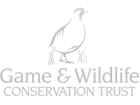Blogs
-

in:
GWCT News Blog
Fingask Castle on Sunday 7th December was the setting for a great day of celebration for a select group of youngsters as they were awarded for their artistic talent.
-

in:
GWCT News Blog
This week the Government published an updated Environmental Improvement Plan (EIP) following the rapid review initiated in July 2024. This revision now links the goals with commitments and actions so there is a pathway to delivery. But will these actions achieve their aim?
-

in:
GWCT News Blog
under:
Waders
Director of Research Dr. Andrew Hoodless explains more about the ground breaking project researching common snipe migration that you can support through the GWCT Snipe Appeal.
-

in:
GWCT News Blog
A group of local farmers has set-up a new on-farm water testing laboratory to monitor the health of the Bourne, a tributary of the River Avon.
-

in:
GWCT News Blog
under:
Policy
Many of GWCT’s policy messages relate to the benefits of land management and the need for interventions. Land management and associated practices can support policy outcomes in a variety of areas from carbon sequestration protection to nature recovery, sustainable food production, and economic development.
-

in:
GWCT News Blog
Hedgerows are a defining feature of the British countryside, offering far more than aesthetic appeal. When managed with care, they provide a wealth of ecological benefits and contribute meaningfully to sustainable land management.
-

in:
GWCT News Blog
I have long been buying raffle tickets with no expected hope of success just the knowledge that my modest contribution to the Game & Wildlife Conservation Trust would help their vital and important research work to support shooting.
-

in:
GWCT News Blog
The common snipe (Gallinago gallinago) has long fascinated ornithologists for its cryptic plumage, zig-zag flight and this haunting “drumming” display. Yet for all its charisma, the snipe’s migration ecology remains surprisingly under-studied compared to other waders.
-

in:
GWCT News Blog
Barn owls are one of the UK’s most iconic farmland birds and an easy way to help support these beautiful creatures populations is by putting up a barn owl nest box. But this is only the first step.
-

in:
GWCT News Blog
Natural England have published a bulletin outlining some small changes to the General Licences for wild bird control, GL 40 - 42 as they take responsibility for the licences from Defra for 2026.
Get the Latest News & Advice
Join over 100,000 subscribers and stay updated on our latest advice, research, news and offers.
*You may change your mind any time. For more information, see our Privacy Policy.